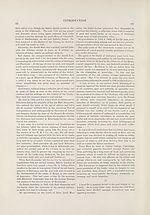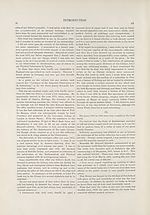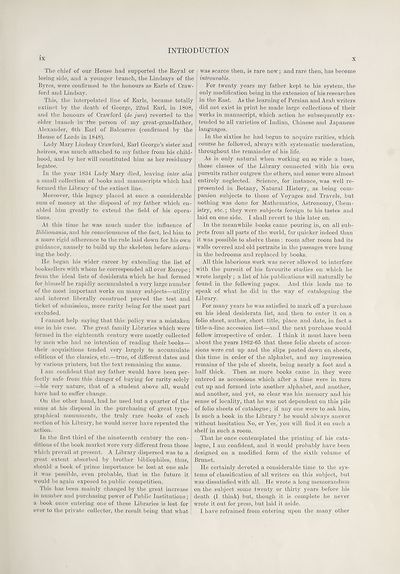Catalogue of the printed books preserved at Haigh Hall, Wigan, Co. Pal. Lancast > A--D
(15) Columns ix and x
‹‹‹ prev (14)
Columns vii and viii
(16) next ›››
Columns xi and xii
Download files
Complete book:
Individual page:
Thumbnail gallery: Grid view | List view

INTRODUCTION
IX
The chief of our House had supported the Royal or
losing side, and a younger branch, the Lindsays of the
Byres, were confirmed to the honours as Earls of Craw¬
ford and Lindsay.
This, the interpolated line of Earls, became totally
extinct by the death of George, 22nd Earl, in 1808,
and the honours of Crawford {de jure) reverted to the
elder branch in the person of my great-grandfather,
Alexander, 6th Earl of Balcarres (confirmed by the
House of Lords in 1848).
Lady Mary Lindsay Crawford, Earl George's sister and
heiress, was much attached to my father from his child¬
hood, and by her will constituted him as her residuary
legatee.
In the year 1834 Lady Mary died, leaving inter alia
a small collection of books and manuscripts which had
formed the Library of the extinct line.
Moreover, this legacy placed at once a considerable
sum of money at the disposal of my father which en¬
abled him greatly to extend the field of his opera¬
tions.
At this time he was much vuider the influence of
Bibliomania, and his consciousness of the fact, led him to
a more rigid adherence to the rule laid down for his own
guidance, namely to build up the skeleton before adorn¬
ing the body.
He began his wider career by extending the list of
booksellers with whom he corresponded all over Europe ;
from the ideal lists of desiderata which he had formed
for himself he rapidly accumulated a very large number
of the most important works on many subjects—utility
and interest liberally construed proved the test and
ticket of admission, mere rarity being for the most part
excluded.
I cannot help saying that this policy was a mistaken
one in his case. The great family Libraries which were
formed in the eighteenth century were mostly collected
by men who had no intention of reading their books—
their acquisitions tended very largely to accumulate
editions of the classics, etc.—true, of diff"erent dates and
by various printers, but the text remaining the same.
I am confident that my father would have been per¬
fectly safe from this danger of buying for rarity solely
—his very nature, that of a student above all, would
have had to suffer change.
On the other hand, had he used but a quarter of the
sums at his disposal in the purchasing of great typo¬
graphical monuments, the truly rare books of each
section of his Library, he would never have repented the
action.
In the first third of the nineteenth century the con¬
ditions of the book market were very different from those
which prevail at present. A Library dispersed was to a
great extent absorbed by brother bibliophiles, thus,
should a book of prime importance be lost at one sale
it was possible, even probable, that in the future it
would be again exposed to public competition.
This has been mainly changed by the great increase
in number and purchasing power of Public Institutions;
a book once entering one of these Libraries is lost for
ever to the private collector, the result being that what
was scarce then, is rare now; and rare then, has become
introuvable.
For twenty years my father kept to his system, the
only modification being in the extension of his researches
in the East. As the learning of Persian and Arab writers
did not exist in print he made large collections of their
works in manuscript, which action he subsequently ex¬
tended to all varieties of Indian, Chinese and Japanese
languages.
In the sixties he had begun to acqviire rarities, which
course he followed, always with systematic moderation,
throughout the remainder of his life.
As is only natural when working on so wide a base,
those classes of the Library connected with his own
pui'suits rather outgrew the others, and some were almost
entirely neglected. Science, for instance, was well re¬
presented in Botany, Natural History, as being com¬
panion subjects to those of Voyages and Travels, but
nothing was done for Mathematics, Astronomy, Chem¬
istry, etc.; they were subjects foreign to his tastes and
laid on one side. I shall revert to this later on.
In the meanwhile books came pouring in, on all sub¬
jects from all parts of the world, far quicker indeed than
it was possible to shelve them : room after room had its
walls covered and old portraits in the passages were hung
in the bedrooms and replaced by books.
All this laborious work was never allowed to interfere
with the pursuit of his favourite studies on which he
wrote largely ; a list of his publications will naturally be
found in the following pages. And this leads me to
speak of what he did in the way of cataloguing the
Library.
For many years he was satisfied to mark off a purchase
on his ideal desiderata list, and then to enter it on a
folio sheet, author, short title, place and date, in fact a
title-a-line accession list—-and the next pixrchase would
follow irrespective of order. I think it must have been
about the years 1862-65 that these folio sheets of acces¬
sions were cut up and the slips pasted down on sheets,
this time in order of the alphabet, and my impression
remains of the pile of sheets, being nearly a foot and a
half thick. Then as more books came in they were
entered as accessions which after a time were in turn
cut up and formed into another alphabet, and another,
and another, and yet, so clear was his memory and his
sense of locality, that he was not dependent on this pile
of folio sheets of catalogue ; if any one were to ask him,
Is such a book in the Library ? he would always answer
without hesitation No, or Yes, you will find it on such a
shelf in such a room.
That he once contemplated the printing of his cata¬
logue, I am confident, and it would probably have been
designed on a modified form of the sixth volume of
Brunet.
He certainly devoted a considerable time to the sys¬
tems of classification of all writers on this subject, but
was dissatisfied with all. He wrote a long memorandunr
on the subject some twenty or thirty years before his
death (I think) but, though it is complete he never
wrote it out for press, but laid it aside.
I have refrained from entering upon the many other
IX
The chief of our House had supported the Royal or
losing side, and a younger branch, the Lindsays of the
Byres, were confirmed to the honours as Earls of Craw¬
ford and Lindsay.
This, the interpolated line of Earls, became totally
extinct by the death of George, 22nd Earl, in 1808,
and the honours of Crawford {de jure) reverted to the
elder branch in the person of my great-grandfather,
Alexander, 6th Earl of Balcarres (confirmed by the
House of Lords in 1848).
Lady Mary Lindsay Crawford, Earl George's sister and
heiress, was much attached to my father from his child¬
hood, and by her will constituted him as her residuary
legatee.
In the year 1834 Lady Mary died, leaving inter alia
a small collection of books and manuscripts which had
formed the Library of the extinct line.
Moreover, this legacy placed at once a considerable
sum of money at the disposal of my father which en¬
abled him greatly to extend the field of his opera¬
tions.
At this time he was much vuider the influence of
Bibliomania, and his consciousness of the fact, led him to
a more rigid adherence to the rule laid down for his own
guidance, namely to build up the skeleton before adorn¬
ing the body.
He began his wider career by extending the list of
booksellers with whom he corresponded all over Europe ;
from the ideal lists of desiderata which he had formed
for himself he rapidly accumulated a very large number
of the most important works on many subjects—utility
and interest liberally construed proved the test and
ticket of admission, mere rarity being for the most part
excluded.
I cannot help saying that this policy was a mistaken
one in his case. The great family Libraries which were
formed in the eighteenth century were mostly collected
by men who had no intention of reading their books—
their acquisitions tended very largely to accumulate
editions of the classics, etc.—true, of diff"erent dates and
by various printers, but the text remaining the same.
I am confident that my father would have been per¬
fectly safe from this danger of buying for rarity solely
—his very nature, that of a student above all, would
have had to suffer change.
On the other hand, had he used but a quarter of the
sums at his disposal in the purchasing of great typo¬
graphical monuments, the truly rare books of each
section of his Library, he would never have repented the
action.
In the first third of the nineteenth century the con¬
ditions of the book market were very different from those
which prevail at present. A Library dispersed was to a
great extent absorbed by brother bibliophiles, thus,
should a book of prime importance be lost at one sale
it was possible, even probable, that in the future it
would be again exposed to public competition.
This has been mainly changed by the great increase
in number and purchasing power of Public Institutions;
a book once entering one of these Libraries is lost for
ever to the private collector, the result being that what
was scarce then, is rare now; and rare then, has become
introuvable.
For twenty years my father kept to his system, the
only modification being in the extension of his researches
in the East. As the learning of Persian and Arab writers
did not exist in print he made large collections of their
works in manuscript, which action he subsequently ex¬
tended to all varieties of Indian, Chinese and Japanese
languages.
In the sixties he had begun to acqviire rarities, which
course he followed, always with systematic moderation,
throughout the remainder of his life.
As is only natural when working on so wide a base,
those classes of the Library connected with his own
pui'suits rather outgrew the others, and some were almost
entirely neglected. Science, for instance, was well re¬
presented in Botany, Natural History, as being com¬
panion subjects to those of Voyages and Travels, but
nothing was done for Mathematics, Astronomy, Chem¬
istry, etc.; they were subjects foreign to his tastes and
laid on one side. I shall revert to this later on.
In the meanwhile books came pouring in, on all sub¬
jects from all parts of the world, far quicker indeed than
it was possible to shelve them : room after room had its
walls covered and old portraits in the passages were hung
in the bedrooms and replaced by books.
All this laborious work was never allowed to interfere
with the pursuit of his favourite studies on which he
wrote largely ; a list of his publications will naturally be
found in the following pages. And this leads me to
speak of what he did in the way of cataloguing the
Library.
For many years he was satisfied to mark off a purchase
on his ideal desiderata list, and then to enter it on a
folio sheet, author, short title, place and date, in fact a
title-a-line accession list—-and the next pixrchase would
follow irrespective of order. I think it must have been
about the years 1862-65 that these folio sheets of acces¬
sions were cut up and the slips pasted down on sheets,
this time in order of the alphabet, and my impression
remains of the pile of sheets, being nearly a foot and a
half thick. Then as more books came in they were
entered as accessions which after a time were in turn
cut up and formed into another alphabet, and another,
and another, and yet, so clear was his memory and his
sense of locality, that he was not dependent on this pile
of folio sheets of catalogue ; if any one were to ask him,
Is such a book in the Library ? he would always answer
without hesitation No, or Yes, you will find it on such a
shelf in such a room.
That he once contemplated the printing of his cata¬
logue, I am confident, and it would probably have been
designed on a modified form of the sixth volume of
Brunet.
He certainly devoted a considerable time to the sys¬
tems of classification of all writers on this subject, but
was dissatisfied with all. He wrote a long memorandunr
on the subject some twenty or thirty years before his
death (I think) but, though it is complete he never
wrote it out for press, but laid it aside.
I have refrained from entering upon the many other
Set display mode to: Large image | Transcription
Images and transcriptions on this page, including medium image downloads, may be used under the Creative Commons Attribution 4.0 International Licence unless otherwise stated. ![]()
| Bibliotheca Lindesiana catalogues > Catalogue of the printed books preserved at Haigh Hall, Wigan, Co. Pal. Lancast > A--D > (15) Columns ix and x |
|---|
| Permanent URL | https://digital.nls.uk/105899972 |
|---|
| Attribution and copyright: |
|
|---|---|
| Description | Privately printed catalogues of the special collections of the Bibliotheca Lindesiana, the family library of the Earls of Crawford and Balcarres. Reformation Tracts, English Newspapers and De Bry Collection catalogues provide the only record of the contents of these collections. Also include catalogues of Bibliotheca Lindesiana collections now held elsewhere. |
|---|